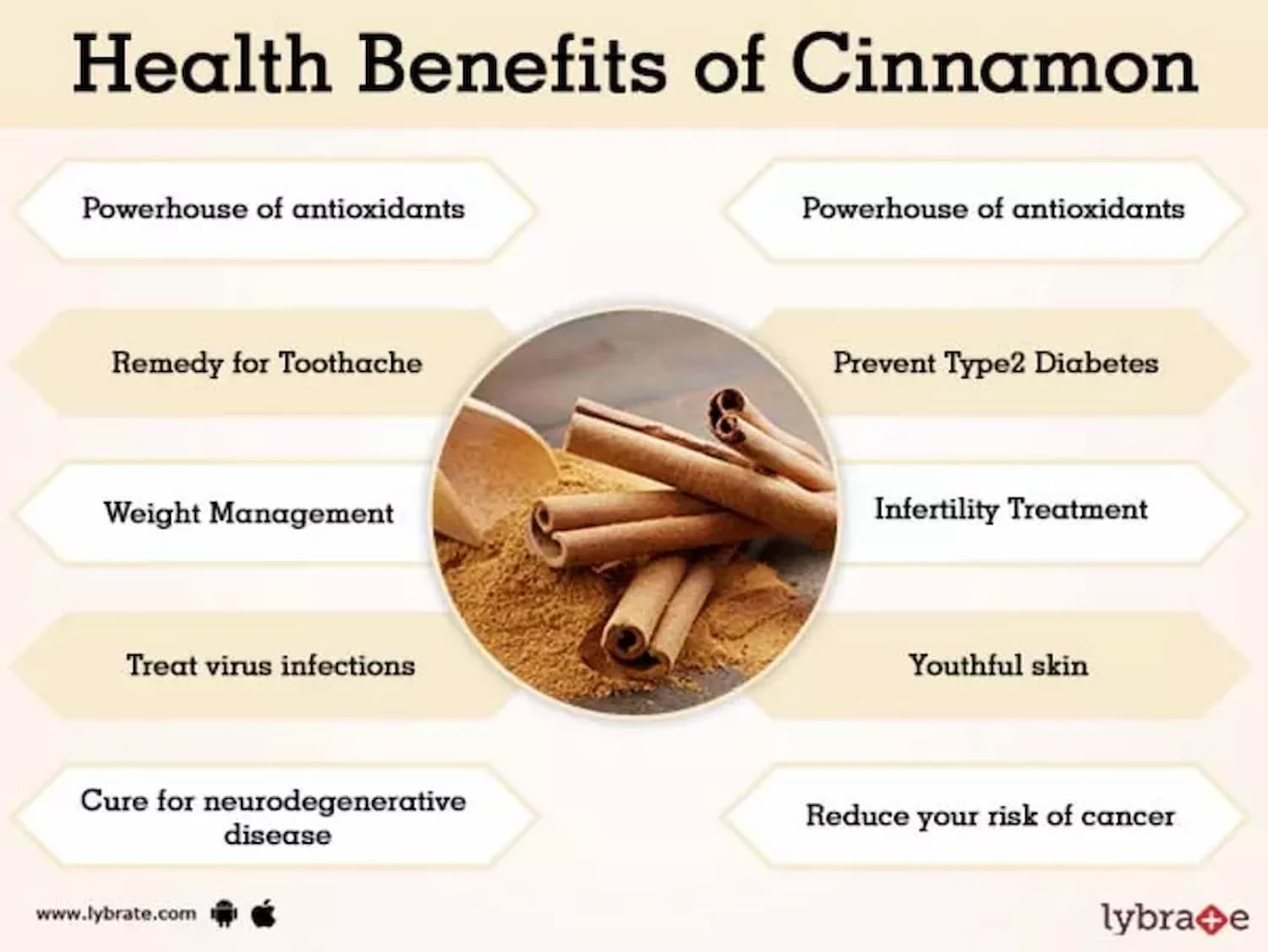
Cinnamon is a well known spice used in cooking, but did you know that it can also be used therapeutically? Cinnamon actually has a wide range of health benefits. Read on to learn more.
What is Cinnamon?
Cinnamon, also known as sweet cinnamon, Ceylon cinnamon or true cinnamon, is a spice that comes from the inner bark of several types of cinnamon trees, including Cinnamomum burmannii, Cinnamomum cassia, otherwise known as Cinnamomum aromaticum, and other other varieties belonging to the Cinnamomum genus.
Cinnamon is famous for its use as a culinary spice, but it also has several medicinal benefits. In fact, the health benefits of cinnamon have been known for over 5,000 years and were recognised by the Egyptians, Ancient Romans and Chinese. Cinnamon is available in a dried, tubular form known as a quill, or as a ground powder. The two main varieties of cinnamon – Cassia and Ceylon – have a similar flavour; however, Ceylon cinnamon is slightly sweeter and more refined. Cassia cinnamon is the more commonly found variant in grocery stores and the like.
Benefits of Cinnamon
The health benefits of cinnamon come from the chemical compounds found in this fragrant spice that contain antibacterial and antifungal properties. This common spice has many medicinal purposes, including the treatment of yeast infections and oral bacteria. It also has antioxidant properties that help to protect cells throughout the body from oxidative stress. Cinnamon also has anti-inflammatory properties, making it useful for people who suffer from conditions that cause chronic inflammation in the body.
Cinnamon has several health benefits, including:
- lowers blood pressure
- lowers LDL cholesterol (the bad cholesterol), total cholesterol and triglycerides
- has a regulatory effect on blood sugar levels, making it particularly helpful for people with type 2 diabetes
- has an anti-clotting effect on the blood
- inhibits bacterial growth and food spoilage when added to food, making it a natural food preservative
- boosts cognitive function and memory when inhaled
- serves as a source of manganese, fibre, iron and calcium
- the combination of calcium and fibre in cinnamon can help to remove bile, which prevents damage to the colon and protects it from colon cancer
- stops the growth of bacteria and fungi (such as the common yeast, Candida)
- prevents inflammation that causes arthritis pain, liver disease, and increases the risk of heart disease
In Traditional Chinese Medicine, cinnamon is used for colds, flatulence, nausea, diarrhoea and painful menstrual periods. It is also believed to improve energy, vitality and circulation, and it is particularly useful for people that tend to feel hot in their upper body but have cold feet. In Ayurveda, cinnamon is used as a remedy for diabetes, indigestion and colds, and it is often recommended for people with the Kapha Ayurvedic type.
Source: Lybrate
Drinking 1/2 teaspoon of ground cinnamon in green tea can help with weight loss and melting belly fat. According to a 2017 animal study, cinnamaldehyde is an active ingredient in cinnamon that heats up the body, allowing it to burn calories more quickly.
The healing abilities of cinnamon come from the three basic types of components in the essential oils found in its bark. These oils contain active components called cinnamaldehyde, cinnamyl acetate and cinnamyl alcohol, plus a range of other volatile substances.
Ceylon Cinnamon vs Cassia Cinnamon - What's the Difference?
The two most popular types of cinnamon are Ceylon and cassia. While these spices have many similar properties, they have their distinct characteristics as well. The main difference between these two types of cinnamon is their chemical composition: cassia has high levels of coumarin content, while Ceylon cinnamon does not.
Ceylon cinnamon sticks are smooth and flat, while cassia cinnamon sticks are thicker and more difficult to break off. The latter has a coarser texture due to the larger pieces of bark included in its composition. Ceylon cinnamon is much lighter in weight because it contains fewer volatile oils. Both types of cinnamon have a warm and spicy flavour, but cassia cinnamon has an aromatic note that gives it a slightly sweeter flavour profile than Ceylon cinnamon.
Cassia cinnamon is a common ingredient used in numerous recipes, which explains why it is widely sold in supermarkets. However, it contains coumarin that has been linked to liver problems when consumed in large amounts over time. Ceylon cinnamon, on the other hand, does not contain coumarin and has a more delicate scent and flavour. According to health experts, even in high doses, this type of cinnamon has no harmful effects. The Ceylon variant, which originates from Sri Lanka, is more expensive than cassia cinnamon.
While cinnamon is one of the healthy spices we can get from the earth, eating too much of it can be harmful, especially in people with chronic diseases.
The Safety of Cinnamon
Cinnamon is safe to take, but people who are taking diabetes medication or any other medication that affects blood glucose or insulin levels shouldn’t take therapeutic doses of cinnamon without the supervision of a medical professional. This is because taking the two together can have an additive effect and cause blood sugar levels to drop too low. Cassia cinnamon contains a compound called coumarin, and at high levels, coumarin can damage the liver.
Coumarin can also have a blood thinning effect so cassia cinnamon supplements should not be taken by people who are taking anti-clotting medication. Lastly, pregnant women should avoid excessive amounts of cinnamon and should not take it as a supplement. They should consume no more than one or two cinnamon sticks a day, lest their blood glucose levels shoot up, or they experience uterine contractions.
What to Look for When Purchasing Cinnamon
When buying cinnamon, make sure to buy it from a reputable online seller who clearly labels the product based on the type of variant it is. You can also enquire with your local organic grocer about products that do not contain any additional ingredients. Also, before purchasing the product, carefully read the label, as some manufacturers may try to pass off their products as pure cinnamon, but they may actually contain other ingredients that may cause allergic reactions.
Cinnamon is generally considered safe when used properly. If you are considering taking cinnamon supplements, be sure to consult your doctor or dietitian before doing so. They can best advise you on the proper dosage of cinnamon based on your specific health needs and current treatment plan.
Originally published on Dec 28, 2008









